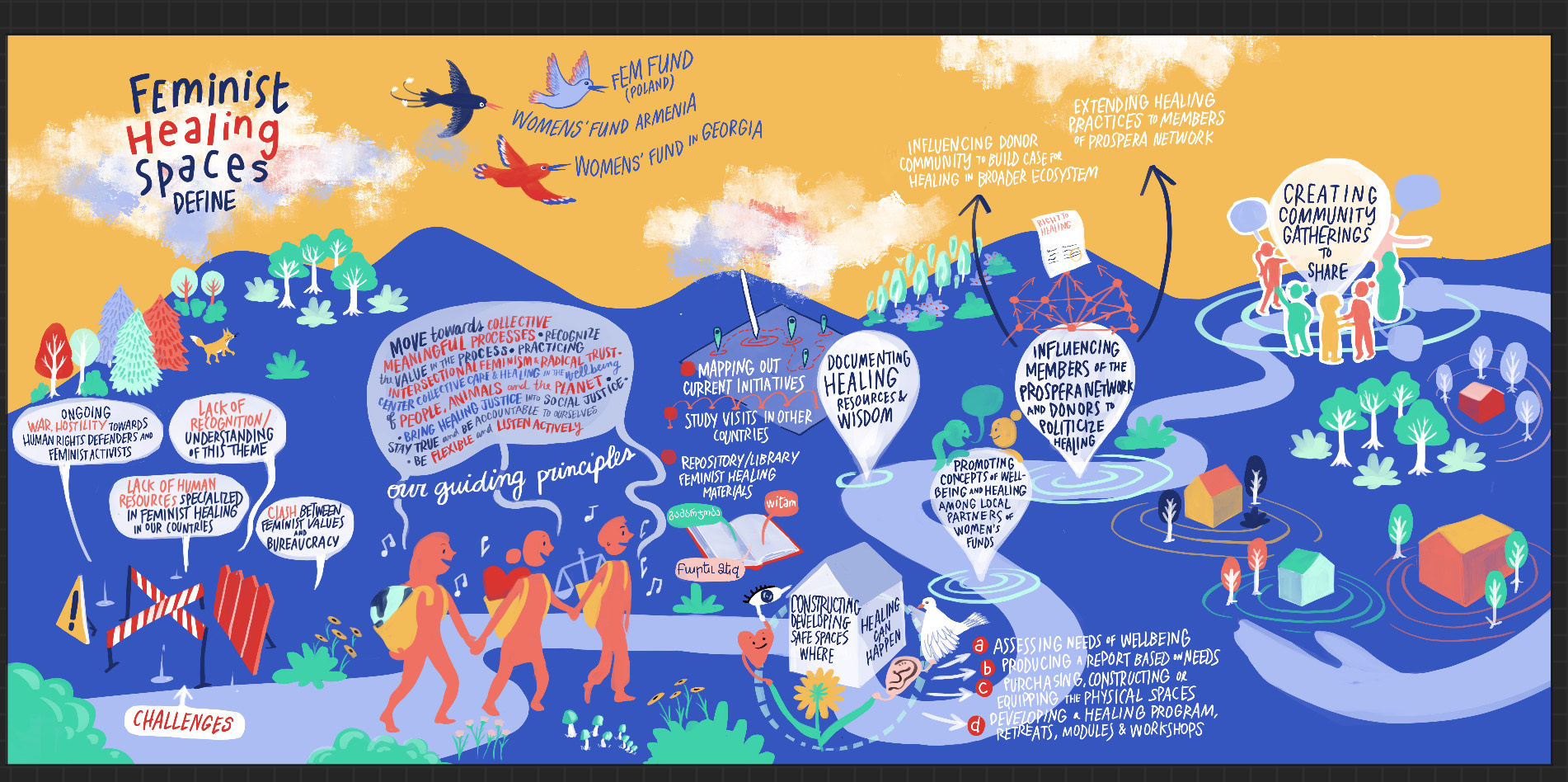Written by Macu Barcia
As part of the Fenomenal Funds Collaboration Grants, FemFund (Poland), Women’s Fund Armenia, and Women’s Fund in Georgia came together to form a collaborative on healing spaces. In this blog post, we tell you all about this collaboration and what it hopes to achieve. The work of this group is also connected to the broader theme of collective care, which is being addressed by three other collaboratives.
What is this collaboration about?
“Healing is a political act that brings a more humane approach to work and can support women’s funds to operationalize the vision of what it means to be a feminist fund.”
Feminist activists often live in oppressive environments, where trauma, tensions, conflict, and violence affect the ways in which activists communicate with each other. This collaboration seeks to collect feminist organizations’ knowledge about healing practices and to operationalize these practices in the ecosystems in which women’s funds, their partners, and feminist activists operate. It also strives to nurture a culture of wellbeing and collective care that addresses trauma and helps build a movement that is based on feminist values of care and solidarity, with healing understood as forming an integral part of feminist movement building.
Why is it important for women´s funds to focus on healing?
“It is of key importance that progressive movements own land and spaces that can operate in accordance with feminist values.”
Each of the participating countries in this collaboration is affected by harsh and oppressive systems, compounded by the aftermath of armed conflicts. In such challenging contexts, healing is a key and necessary precondition for systemic transformation to take place.
Healing also requires physical spaces where recovery from traumatic experiences can actually happen. The idea of such spaces is that they serve the larger community of feminist movements and respond to their needs. Physical healing spaces will not only contribute to enhancing the sustainability of feminist funds but also enable feminist and women’s funds to deliver support beyond grants and capacity building. Thus, safe spaces are an important resource for the movements to thrive.
What do we want to achieve together?
The work on Feminist Healing Spaces will translate our feminist values—politics of care, intersectional feminism, and systemic transformation—into tangible actions: live up to what we preach, exercise feminist values in daily practices, and integrate them into the activists’ organizing culture that we cocreate.
We will map existing initiatives to learn how communities heal. This will enable us to build knowledge on common and different traditions and approaches to feminist healing practices and rituals that speak to local contexts and includes ancestral wisdom.
Working on healing will enable us to acknowledge the experiences of trauma derived from patriarchal socialization as well as from war and political, social, and economic crises. It will also help us visualize and address existing tensions in our feminist movements.
We hope to develop a feminist narrative about trauma and healing that can help us understand collective healing as our feminist response to trauma, in contrast to the existing neoliberal and individualistic understanding of resilience and wellbeing.
This collaboration will explore how the politics of healing can become an integral part of the women’s funds universe to make it more effective, radical, and bold.
What have been some key highlights on the process?
“The process has been very inclusive, thorough, and enjoyable. The last couple of months gave women’s funds an opportunity to connect with each other on a deeper level, explore the possibilities of creating together, and make this thinking real.”
The journey of forming this collaboration has been process oriented. It has also enabled the participating women’s funds to engage in collective, meaningful discussions to share what healing means for each of us and to identify relevant areas of work that we want to develop together.
Recognizing the value of the process—and not just the outcome—has supported trust building and has encouraged the group to move beyond transactional ways of working. We have taken time in our conversations to learn and care for each other and put at the center the needs of each person and organization.
This is what this collaboration is dreaming to address and work on.


